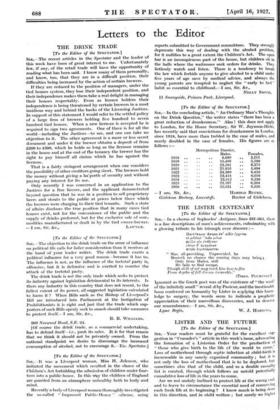Letters to the Editor THE DRINK TRADE [To the Editor
of the SPECTATOR.] &Ili—The recent articles in the Spectator and the leader of this week have been of great interest to me. Unfortunately few, if any, of the retail trade will have the opportunity of reading what has been said. I know many of them personally, and know, too, that they are in a difficult position, their difficulties being. increased by the action of certain brewers.
If they are reduced to the position of managers, under the tied houses system, they lose their independent position, and their independence makes them take a real delight in managing their houses respectably. Even as licence holders their independence is being threatened by certain brewers in a most insidious way and behind the backs of the Licensing Justices.
In support of this statement I would refer to the settled policy of a large firm of brewers holding five hundred to seven hundred tied houses. When a new licensee is accepted he is required to sign two agreements. One of these is for all the world—including the Justices—to see, and one can take no objection to it. The other agreement is a more or less secret document and under it the brewer obtains a deposit of from £200 to £500, which he holds so long as the licensee remains in the house and at the end of the tenancy the brewer has the right to pay himself all claims which he has against the licensee.
That is a fairly stringent arrangement when one considers the possibility of other creditors going short. The brewers hold the money without giving a ha'porth of security and without paying any interest for its use.
Only recently I was concerned in an application to the Justices for a free licence, and the applicant demonstrated beyond question that he was in a position to sell proprietary beers and stouts to the public at prices below those which the brewers were charging to their tied tenants. Such a state of affairs discloses the true position that in many cases tied houses exist, not for the convenience of the public and the supply of drinks preferred, but for the exclusive sale of corn.. modities manufactured or dealt in by the tied owner-brewer.


































 Previous page
Previous page